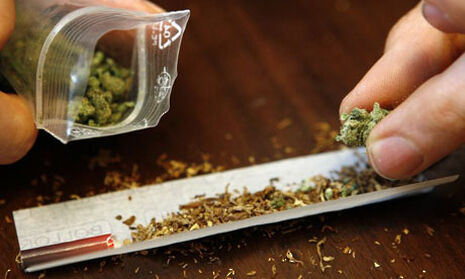Drug Survey: The Score
The results of Varsity’s drug survey are out revealing a broad range of results.
Over 60% of Cambridge students admitted to having taken illegal drugs, a Varsity survey reveals.
The online survey was open to all members of the University, but was taken almost entirely by undergraduates.
It paints the picture of a scene of mixed perceptions with students disagreeing strongly over whether there is much of a drugs scene or problem among Cambridge students.
According to the results, 63% of students have taken illegal drugs, with 45% of them having experimented before they had even turned 16.
While in Cambridge, 45% of those who take drugs admitted to buying illegal drugs for their friends. Alarmingly, 8% of all students who took the survey, or 14% of those who had used illegal drugs, also admitted to having sold drugs for a profit, which would be considered dealing drugs in the eyes of the law.
More students seemed to see a problem in others rather than themselves as 35% of people felt that at least one of their friends had a serious drug problem.
The responses, though, suggest that there is no serious drug problem in Cambridge with students believing any drug scene to be “pretty relaxed” and “more chilled than at other universities”. This is despite 14% of students who had taken drugs saying that they had been hospitalised or required professional medical attention as a result.
While 35% of students believe their friends to have serious drug problems, only 5% admitted to using illegal drugs daily with 78% of them taking drugs, at most, on a monthly basis.

This is reflected in the type of drugs taken with marijuana unsurprisingly being the most popular. 61% of students who use illegal drugs, use marijuana more commonly than other drugs, with 55% of all students believing it to be the least harmful of the listed drugs, including tobacco.
Less than 1% of students say they take heroin more frequently than any other drug, while cocaine is the most commonly taken Class A drug. This was reflected in the comments with several students remarking how Cambridge was more noticeable for its cocaine use than other universities.
The findings suggest that not much may have changed since four years ago when Varsity found evidence of cocaine use at eight colleges as well as other popular student venues.
Though Cambridge’s drug scene may not be prolific, the comments revealed a protective attitude towards drugs, often comparing it favourably against alcohol.
Despite the survey not including alcohol as an option for ‘most dangerous drug’, many participants took pains to outline the health threat alcohol poses, despite its socialisation.
One survey participant identified Cambridge as “a city where students ‘overdose’ on alcohol on a regular basis’” and this is ‘overwhelmingly more of a problem’ than drug abuse.
Several identified the social scene as alcohol-fuelled, with friends who may not be drug addicts but are identified instead as alcoholics.
It was further explained how, “Drugs are still very much misunderstood...people prefer to get smashed on alcohol, a drug that ruins a huge number of lives. I’d say I admire drugs from afar - most people here seem to terrified of them, but regard alcohol as something safe and normal.”

These comments on alcohol often accompanied calls to legalise cannabis, while cocaine was often highlighted as a drug very typical of Cambridge with there being “an awful lot of cocaine use in comparison to other universities I’ve studied at.”
A common theme was how drugs affect work as 70% of students claimed that using illegal drugs did not affect their ability to work, while 20% of those asked said that they had taken drugs to manage the stress or workload.
This was reflected in the comments too: “I think drugs are used sensibly by students in Cambridge. It is unsurprising in such a high stress environment that so many students use drugs as a way to relax and completely disconnect from this.”
Indeed, one student went as far to suggest that they, and others, chose what drugs they took based on the Cambridge workload: “Ketamine seems to be getting more popular because you can get really mashed but feel OK to study the next day.”
However, Richard Ashcroft needn’t be ripping up his lyrics just yet with most people saying that they refrain for the sake of their work.
And, as if to prove that the drugs don’t work: “Someone took 2CB the night before a maths exam and got 1%, another guy took so many uppers for a sustained period of time that his skin started to shed like a snake.”
This article appeared in the print edition of 24/2/2012 with the claim in the heading that 14% of Cambridge students had sold drugs for profit – this was incorrect, for which we apologise. The article above contains the correct figures.
 News / Cambridge academics stand out in King’s 2026 Honours List2 January 2026
News / Cambridge academics stand out in King’s 2026 Honours List2 January 2026 Comment / Plastic pubs: the problem with Cambridge alehouses 5 January 2026
Comment / Plastic pubs: the problem with Cambridge alehouses 5 January 2026 News / Cambridge businesses concerned infrastructure delays will hurt growth5 January 2026
News / Cambridge businesses concerned infrastructure delays will hurt growth5 January 2026 News / AstraZeneca sues for £32 million over faulty construction at Cambridge Campus31 December 2025
News / AstraZeneca sues for £32 million over faulty construction at Cambridge Campus31 December 2025 Interviews / You don’t need to peak at Cambridge, says Robin Harding31 December 2025
Interviews / You don’t need to peak at Cambridge, says Robin Harding31 December 2025








